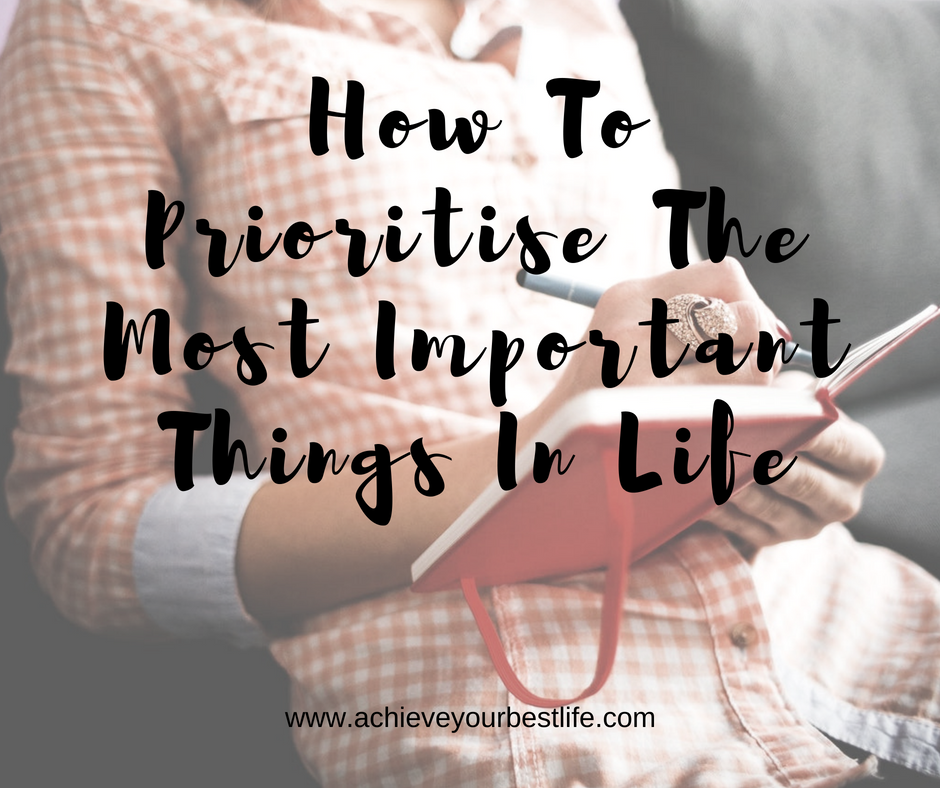
How To Prioritise The Most Important Things In Life
This is the second of a two-part blog looking at prioritising. Last week we looked at how to figure out what are our real priorities. In this blog, we’ll be looking at how to actually use those findings to prioritise the most important things we should work on each and every day. Ahead of all the emergencies, drama and trivia that comes out way!
Firstly, let me say that I fully appreciate that it’s often not easy to prioritise our needs ahead of those of the people we love. It can often feel selfish or even ignorant to take care of our own needs first, whilst we know that someone is wanting to spend time with us or just needs their laundry doing!
But, learning to prioritise the most important things and then actually working on them, will still leave you with enough energy to get the other stuff sorted to.
At this point I have to say ‘after a fashion’, as, in reality, standards of perfection may have to slip too, but accepting that good enough is good enough will stand you in good stead to implement the following ideas.
So, these are my top tips for getting the most important, life changing things done. Some of these suggestions will probably be unpopular and maybe even difficult, but, if you’re serious about wanting to improve your category scores, then I strongly suggest you implement as many of these as possible.
Get Up Earlier!
I hate to say it, but this single method, although unpopular, will have the biggest immediate positive effect on your efforts to improve one or more of your category scores – but only as long as you use the additional time to work on your most important things!
In other words, don’t get up earlier and think I’ll just get the washing on first or clean the kitchen, then I can settle to my important stuff. No, no, no!!
Get straight to your important tasks, even if it’s just for 15 – 30 minutes. Do this before anyone else in the house is up and looking for your attention. Be strong and put yourself first. Be disciplined and put your future self in the picture.
Related Post: The Miracle Morning
To make this work, you really need to know exactly what you’re going to be working on when you get up. Under no circumstances should you rely on your early morning brain to make the decision as to what’s important as you will invariably fall into your usual morning habits!
So, decide the night before what you’ll be doing, set out the things you’ll need and when you get up, don’t allow your brain and habits to overrule your new decision, just get straight to it.
Understand the Difference Between Important v Urgent
Which brings me on to my next top tip.
When you’re trying to prioritise work on areas of your life that have previously been somewhat neglected, it can be easy to fall into the trap of dealing with the ‘urgent’ stuff rather than the ‘important’ stuff.
On a general level, the important v urgent state is quite possibly what has brought you to your low category score in a number of areas, since life has a way of throwing emergencies our way, even though they are often somewhat mundane.
Taking the example of your finances, this work is important, but has not yet become an emergency (it will in time!), whereas, making sure the kids/you have clean clothes for school/work or the dog has had his evening walk, is ‘urgent’ or put another way, pressing, and so we tend to prioritise the urgent or pressing stuff at the expense of the most important things.
But, the important v urgent scenario also gets played out within our categories in a subtler way.
Here’s an example:
You want to improve your finances.
This task will require that you look at a lot of areas, but it feels like it’s out of control because you’ve not been opening important mail or checking your account balances.
Also, you have no real budget, there are people who owe you money as well as unpaid bills that could incur a late payment penalty.
Our tendency would be to jump straight in and think, let’s just deal with the urgent stuff, ie, in this case, paying bills that could incur a penalty. By doing this we would feel a sense of relief as well as feeling that we have ‘dealt’ with our finances.
But this is the ‘urgent’ stuff and it has been prioritised at the expense of the ‘important’ financial tasks.
Wouldn’t it feel better to take a step back and formulate a plan? This would create a structured approach to a longer-term solution so that the whole project doesn’t die under a pile of overwhelm.
There’s a whole lot of stuff to consider here, so having a plan will help you feel more structured and in control.
Here’s a suggested approach:
• Open all the mail and sort into piles: discard, file, take action. If there are any final demands that need immediate attention, put them in a separate pile.
• Create a worksheet (excel or paper) and record all your account balances and any payments due.
• Now, consider the urgent payments. Does your bank account have sufficient funds to pay the final demands? If so, make the payment now. If not, make a note of who you will need to talk to (bank or creditor) to negotiate an extended payment period.
• Make a note of anyone who owes you money and how much. Note also if repayment is overdue.
• Create a second worksheet (excel or paper) and create a budget.
By breaking the tasks down into manageable chunks, it will be possible to tackle a task each day or so. This is far more sustainable than taking the emergency approach.
Learn to know and understand the difference when you are dealing with the ‘urgent stuff’ so that you can make sure the ‘important but not urgent’ things gets some daily attention.
Schedule Tasks and Work Against the Clock (for important things and routine tasks)
Do tasks tend to run away with you? Sometimes you get so engrossed you lose track of time (this can be a good thing), but you’ve gone off on a tangent and not kept to the main plan for the day?
It’s a bit like trying to put loads of old photos into an album but ending up reminiscing and taking ages to do the job. It’s a nice process, but not very time efficient!
So, my answer to this is to work against the clock.
Firstly, using your calendar, decide when you’re going to do each of your tasks by scheduling them into distinct time slots. To ensure you keep moving ahead on your most important things, your schedule must include allocated slots for your category goals. It’s also very important to specify what you’re going to do during the allocated slot.
For example:
• Phone florist and order flowers;
• Set up spreadsheet for my new budget;
• Do my yoga practice
Only after you’ve allocated time slots for your most important things should you add your everyday routine tasks.
I then use the timer on my phone or a desktop timer and set up the amount of time I want to dedicate to each task with an alarm to sound at the end.
In this way, it creates a little bit of pressure to keep going.
I find this method is also useful if you have a tendency towards perfectionism as it forces you to do/produce something in the allotted time. After all, you can always go back and amend afterwards.
It’s also a really useful technique if you have some resistance to the task as you can start with a really small amount of time, say 1 minute(!) just to get yourself into action.
In Conclusion
So, there you have my three most powerful tips to help you prioritise and, more importantly, do the most important things in your life!
If this feels like a lot at first, then build them into your life over time. Don’t expect immediate change but be content with your gradual progress.
If you fall off the wagon be prepared to get back on again, and remember, good enough is good enough. Just keep going as best you can aiming to improve a little each day. Over time, you will make and see progress and your category scores will improve!





[…] So in this first part of a two-part blog, we will find out how to identify your priorities and then in the second part, I show you methods to make sure you’re actually progressing these important-to-you tasks. […]